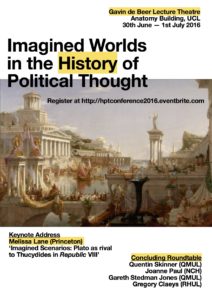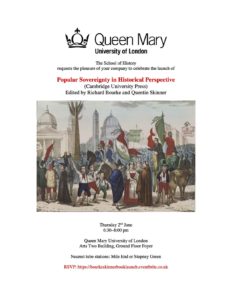The London Summer School in Intellectual History is a rare opportunity for graduate students to acquire further training in the discipline and its different methodologies. Running from 4 to 7 September 2017, the summer school will include:
- Special workshops
- Masterclasses
- Feedback on current research
- Advice on writing and publishing
- Discussion of newly published work in intellectual history
Applications are welcome from doctoral students in intellectual history and related disciplines (the history of philosophy, literature, politics, and science) and from MA students intending to conduct future research in this area.
London is now one of the international centres of research and teaching in the history of political thought and intellectual history with a dedicated graduate programme and year-round research seminars, conferences, and workshops. The Summer School, now in its sixth year, is run jointly by University College London (UCL) and Queen Mary, University of London (QMUL). Keynote lectures this year will be delivered by:
- Ann Thomson (European University Institute, Florence), on “Enlightenment anticolonialism? Raynal, Diderot and L’Histoire des Deux-Indes”
- Quentin Skinner (QMUL), on “Machiavelli and the virtues of the prince”
The discussions will be led by members of staff from the different branches of the University of London and from overseas. In past years these have included Richard Bourke, Katrina Forrester, Gareth Stedman-Jones, and Georgios Varouxakis (QMUL), Hannah Dawson, Jeremy Jennings and Niall O’Flaherty (KCL), Michael Lobban and Lea Ypi (LSE), as well as Valentina Arena, Angus Gowland, Julian Hoppit, Axel Körner, and Avi Lifschitz (UCL). From outside the University of London, they have also included David Armitage (Harvard), Donald Winch and Iain McDaniel (Sussex), Richard Whatmore (St Andrews), Duncan Kelly (Cambridge), Felicity Green (Edinburgh) Iain Hampsher-Monk (Exeter), Martin van Gelderen (Göttingen), and Knud Haakonssen (Erfurt).
To find out what students gained from their experience at the Summer School, please see the London Summer School in Intellectual History blog.
Dates and fees: The event starts on 4 September 2017 in the evening and ends in the afternoon on 7 September 2017. It will take place at the UCL main campus in Bloomsbury. Participants are required to contribute £185, which covers tuition, lunches, and a reception on the first evening. In addition, those who would like accommodation in central London can book a room in one of the UCL Halls of Residence from £52.50 per night.
How to apply: Please send a CV and a brief abstract of current or future research to Shiru Lim at: s.lim.10@ucl.ac.uk The deadline for applications has been extended to 28 July 2017.

